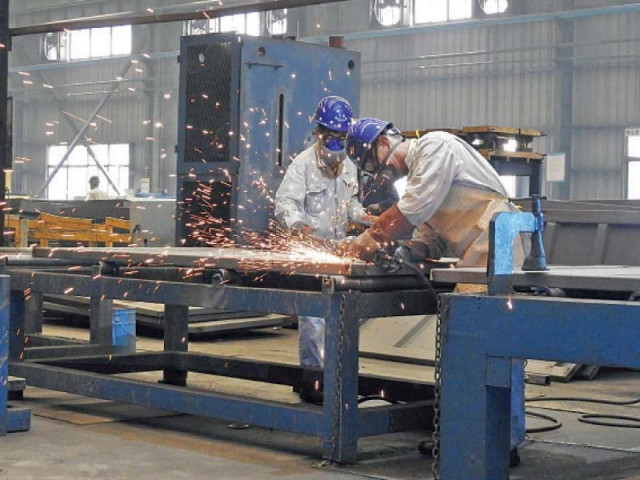Big industries output shrinks
Shows highest negative growth of 16.5% in over two years

As the country embraces the impact of the floods, the output of Pakistan’s large industries also dropped 16.5%, during the first month of the current fiscal year reflecting the impact of recessionary economic policies.
The Pakistan Bureau of Statistics (PBS) reported on Thursday that Large Scale Manufacturing (LSM) decreased by 16.5% during July compared to the preceding month; the highest negative growth rate in over two years. The last time LSM had contracted, by 12% in June 2020, was in the aftermath of the first lockdown to stop the spread of Covid-19.
The national data collecting agency reported that the big industries also showed a 1.4% contraction in July over the same period the last year. The figures pertain to the pre-flood period, as LSM data is reported with a lag.
While 33 million people have been affected by the floods, 15% of Pakistan’s area is inundated with agriculture taking the maximum hit.
PBS reported that provisional quantum indices of LSM Industries for July 2022, with the base year 2015-16, have been developed based on the latest data supplied by the source agencies. However, while compromising transparency, PBS has discontinued source-based separate LSM output results.
Since large industries contribute heavily to revenue collection and job creation, any change in their growth impacts the government and business sentiment accordingly. The negative growth at the start of the fiscal year may not bode well for the economic outlook of the country that is already under the shadows of devastation caused by the floods and political uncertainty.
The Pakistan Democratic Movement (PDM) coalition government has implemented recessionary economic policies which have started taking a toll on economic activities. Aside from paying salaries, government spending is focused primarily on two heads; debt servicing and defence. Development spending in July amounted to only Rs28 billion.
Since September last year, the central bank has more than doubled its interest rate while the rupee has depreciated by nearly one-third since January this year – the two key factors to have increased the cost of doing business in Pakistan significantly.
Read Auto industry calls for easing import curbs
The government and State Bank of Pakistan (SBP) have also enforced strict import controls, forcing industries to reduce output with some closing factories or at least reducing working shifts.
Earlier, the government had set a 5% economic growth rate, which according to the World Bank may now slip to the range of 1.4% to 2.4% due to the floods.
The LSM index slipped to 110.5, which is the lowest reading since July last year.
The PBS stated that the key industries to pull down the growth rate to negative 1.4% on a yearly basis, either due to contraction or low growth rate, were cotton yarn, cotton cloth, garments, iron and steel, petroleum products, fertilisers and cement.
The sectors that posted some growth during July over the same month a year ago include beverages showing a mere 0.3% growth, wearing apparel achieving a 48% increase in output, leather products at 46.5%, wood products at 3%, iron and steel at 13% and football at 40%.
A dip in food output showed a decrease of nearly 10% and tobacco production declined by 76%. The output of the textile sector, which has over 18% weight in the LSM index, showed a contraction of 2.2% in July. The coke and petroleum products output reduced by over 5%, fertilisers were at a negative 18% and pharmaceutical output also decreased by 35%.
Similarly, the production of rubber products, non-metallic mineral products, fabricated metal, computers, electronics, electric equipment, automobiles, and other transport equipment decreased sharply in July over the same period of the last fiscal year.
Published in The Express Tribune, September 23rd, 2022.
Like Business on Facebook, follow @TribuneBiz on Twitter to stay informed and join in the conversation.



















COMMENTS
Comments are moderated and generally will be posted if they are on-topic and not abusive.
For more information, please see our Comments FAQ